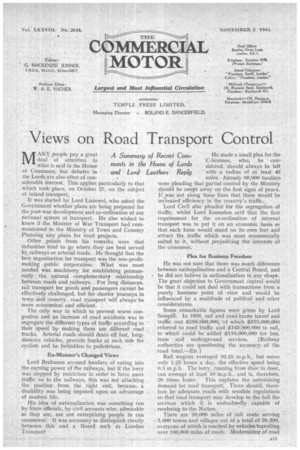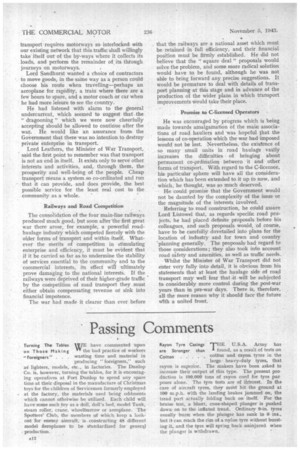Views on Road Transport Control
Page 13

Page 14

If you've noticed an error in this article please click here to report it so we can fix it.
1V1ANY people pay a great A Summary deal of attention to what is said in the House ments in the what is said in the House ments in the of Commons, but debates in and Lord the Lords are also often of con siclerable interest. This applies particularly to that which took place, on October 27, on the subject of inland transport.
• It was started by Lord Listowel, who asked the Government whether plans are being prepared for the post-war development and co-ordination of our national system of transport. He also wished to know if the Minister of War Transport had communicated-to the Ministry of Town and Country Planning any plans for roadprojects.
Other points from his remarks were that industries tend to go where they are best served by railways or arterial roads. He thought that the best organization for transport was the non-profitmaking public corporation. What was most needed was machinery for establishing permanently the natural complementary relationship between roads and railways. For long distances, rail transport for goods and passengers cannot be effectively challenged, but for shorter journeys in town and country, road transport will always' be more economical and efficient.
The only way in which to prevent worse congestion and an increase of road accidents was to segregate the different types of traffic according to their speed by making them use different road tracks. Arterial roads should drain off fast, longdistance vehicles, provide tracks at each side for cyclists and be forbidden to pedestrians.
Ex-Minister's Changed Views Lord Brabazon accused hauliers of eating into the earning power of the railways, but if the lorry was stopped by restriction in order to force more traffic on to the railways, this was not attacking the position from the right end, because a disability was being imposed upon an advantage of modern life.
His idea of nationalization was something run by State officials, by civil servants who, admirable as they are, are not enterprising people to run commerce. It was necessary to distinguish clearly between this and a Board such as London Transport of Recent CornHe made a small plea for the C-licensee, who, he con House of Lords sidered, should always be left_ Leathers Reply with a radius of at least 40 miles. Already 60,000 hauliers were pleading that partial control by the Ministry should be swept away on the first signs of peace.
was not along these lines that there would be inci-eased efficiency in the country's traffic. Lord Cecil also pleaded for the segregation of traffic, whilst Lord Essendon said that the first requitlement for the co-ordination of internal transport was to put it on an economic basis so that each form would stand on its own feet and attract the traffic which was most economically suited to it, without prejudicing the interests of the -consumer.
Plea for Business Freedom He was not sure that there was much difference between.natiblialization and a Central Board, and he did not believe in nationalization in any shape. The great objection to Government control would be that it could not deal with transactions from a purely business point of view and would be influenced by a multitude of political and other considerations.
Some remarkable figures were given by Lord Sempill. In 1938, rail and road-borne travel and traffic cost £588,040,000, 'of which £315,000,000 referred to road traffic and £163,000,000 to rail, to which could be added £110,000,000 for bus, tram and underground services. [Railway authorities are questioning the accuracy of the road total.—ED.1 Rail wagons averaged 10.25 m.p.h., but move only 1.25 hours a day, the effective speed being 0.5 m.p.h. The lorry, running from door to,door, can, average at least 10m.p.h., and is„ therefore, 20 times faster. This explains the astonishing demand for road transport. There should, there , fore be adequate roads with sensible regulations so that road transport may develop to the full the services which it is undoubtedly capable of rendering to the Nation. There are 20,000 miles of rail route serving 7,600 towns and villages out of a total of 39,300, everyone of which is reached by vehicles travelling over 180,000 miles of roads. Modernizing of road • transport requires motorways so interlocked with our existing network that this traffic shall willingly take itself out of the by-ways where it collects its loads, and perform the remainder of its through journeys on motorways.
Lord Saildhurst wanted a choice of contractors to move goods, in the same way as a person could choose his route when travelling—perhaps an aeroplane for rapidity, a train where there are a few hours to spare, and a motor coach or car when he had more leisure to see the country.
He had listened with alarm to the general undercurrent, which seemed to suggest that the " dragooning" which we were now cheerfully accepting should be allowed to continue after the war. He would like art assurance fromthe Government that there was no intention to destroy private enterprise in transport.
Lord Leathers, the Minister of War Transport, said the first point to remember was that transport is not an end in itself. It exists only to serve other interests and activities, and, through them, the prosperity and well-being of the people. Cheap transport means a system so co-ordinated and run that it can provide, and does provide, the best possible service for the least real cost to the community as a whole.
Railways and Road Competition The consolidation of the four main-line railways produced much good, but soon after the first great war there arose, for example, a powerful roadhaulage industry which competed fiercely with the older forms of transport and within itself. Whatever the merits of competition in stimulating enterprise and efficiency, it must be evident that if it be carried so far asto undermine the stability of services essential to the community and to the commercial interests, its effect will ultimately prove damaging to the national interests. If the railways were deprived of their higher-grade traffic by the competition of road transport they must either obtain compensating revenue or sink into financial impotence.
The war had made it clearer than ever before that the railways are a national asset which must be retained in full efficiency, and their financial position must be firmly established. He did not believe that the " square deal " proposals would solve the problem, and some more radical solution would have to be found, although he was not able to bring forward any precise suggestions. It would be premature to deal with details of transport planning at this stage and in advance of the production of the wider plans in which transport improvements would take their place.
Promise to C-licensed Operators He was encouraged by progress which is being made towards amalgamation of the main associations of road hauliers and was hopeful plat the lessons of co-operation which the war had imposed would not be lost. Nevertheless, the existence of so many small units in road haulage vastly increases the difficulties of bringing about permanent co-prdination between it and other forms of transport. With regard to the C-licensee, his particular sphere will have all the consideration which has been extended to it up to now, and which, he thought, was so much deserved.
He could promise that the Government would not be daunted by the complexity of the issue or the magnitude of the interests involved.
Referring to road construction, he cciuld assure Lord Listowel that, as regards specific road projects, he had placed definite proposals before his colleagues, and such proposals would, of course, have to be carefully dovetailed into plans for the location of industry and for town and country 'planning generally. The proposalshad regard to those considerations ; they also took info account road safety and amenities, as well as traffic needs.
Whilst the Minister of War. Transport did not enter very fully into detail, it is obvious from his statements that at least the haulage side of road transport may well fear that -it -will be subjected to considerably more control during the post-war years than in pre-war days. There is, therefore, all the more reason why it should face the future with a united front.




















































